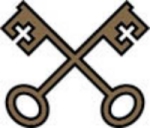| Founder
of the medieval papacy. |
 |
|
Keys
may symbolize the power
of the papacy
|
Son of a Roman senator
and inheritor of vast wealth, Gregory VII founded several monasteries
and entered one of them as a monk. After being summoned from this seclusion
by the pope and serving for a time as a papal diplomat, Gregory himself
became pope in 590. As pope, Gregory found Italy in a shambles, in part
as a result of Lombard invasions. He organized the administration of Italy
as a whole and of the papal estates at the same time. While doing this,
he negotiated a separate peace with the Lombards, bypassing the authority
of the emperor in Constantinople.
These actions paved the way for the rise of the power of the papacy in
the medieval West. As a theologian, Gregory was a prolific author, popularizing
a modified Augustinian theology. He also encouraged many of the practices
of popular medieval Catholicism. Gregory amplified the doctrine of purgatory,
he encouraged the veneration of relics, spread mystical doctrines associated
with Dionysius the Pseudo-Areopagite,
and fostered the standardization of the Roman liturgy in the West. One
of the major initiatives of his papacy was to dispatch Augustine
of Canterbury to evangelize England.
|